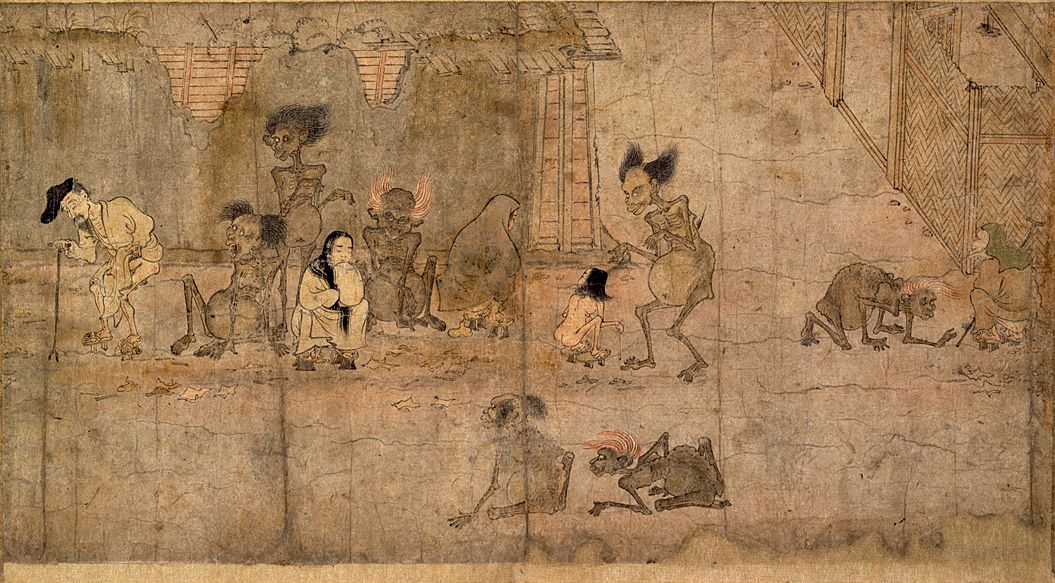
Hungry ghosts are a Buddhist concept, but they’ve spread into other East Asian religious traditions as well. The Sanskrit term for this kind of spirit is preta, which basically means “departed.” The Chinese name for them, èguǐ, means “hungry ghost,” the term that’s often used in other translations as well. These are essentially the souls of people who committed some sort of evil deeds while alive, and are punished with an insatiable hunger in the afterlife. Many legends of hungry ghosts involve someone refusing to share food. In Chinese mythology, it could also be a result of lack of ancestor veneration. So what do ghosts eat? Well, according to children’s jokebooks, such things as spookghetti and boo-berry muffins.

Sugary cereal might also be acceptable.
The hungry ghosts, however, have a variety of appetites. While some just seek regular food and/or water, others eat human flesh or blood, or even excrement.

Hungry ghosts are typically depicted with bloated bellies, tiny mouths, and very thin necks; but this appears to be more of a symbolic thing than anything else.

For some, any food they try to eat bursts into flames or rots.

They’ve been used metaphorically to describe addiction. Buddhist cosmology gives the hungry ghosts their own realm, one of the six for various states of being.

While said to inhabit a hell, they’re frequently said to wander through the world of the living as well, seeking their food of choice.

Source: Mrs. Lin’s Kitchen
In the seventh month of the Chinese calendar, there’s a Hungry Ghost Festival that shares some similiarties with Halloween, in that it’s when the dead mingle with the living, and have to be either appeased or scared away. Food is left out for them, and live entertainments leave the front row empty for the ghosts. Fourteen days after the festival, people place lotus-shaped lanterns on paper boats to guide the ghosts back to the underworld.
The Japanese word for a hungry ghost is gaki, while jikininki are specifically ghosts who eat human corpses.
There’s also an association with the Japanese gods of hunger, or hidarugami. These beings are traditionally Japanese rather than an import from Chinese mythology, but they tend to get mixed together due to the hunger theme.

They’re also spirits of the dead, specifically those who starved to death in the mountains and hence were not properly honored by the living. They possess people and cause extreme starvation, although they can be warded off with only a tiny amount of food. As such, travelers in the mountains of Japan are warned to take a few riceballs with them in case of emergency, probably a good idea even if there aren’t any malicious ghosts out there. Some sites also mention the similarity between hungry ghosts and the fate of the Nephilim or Grigori in the Book of Enoch. These were the offspring of human women with angels known as Watchers, as described in Genesis. God turned them into disembodied spirits who were constantly hungry and thirsty, but had no mouths. Although not quite the same, there’s a thematic link to Tantalus‘ fate in Tartarus as well. And to get into more recent lore, Slimer from Ghostbusters and the ghosts from Pac-Man (and, for that matter, Pac-Man himself; maybe he’s also a ghost?) seem to operate on much the same lines.


The X-Files had a fun episode about Hungry Ghosts. Incidentally, if you haven’t seen it, that’s a show you would enjoy! As regards the Nephilim connection, you wrote that God turned them into disembodied spirits with no mouths, though that’s not quite what the Enoch account says. 1 Enoch and the Book of Giants (which was likely part of the Pentateuch of Enoch) note that they turned into spirit creatures when died as a result of their civil war (the Titanomachy, which God instigated) and the Flood, due to the fact that they were hybrids and had immortal ancestry on the part of their fathers, the fallen Watcher angels. They became what’s properly termed demons. They don’t eat not because of a lack of mouth, but for the same reason that spirit beings don’t eat, though their appetites remain (likely intended in more ways than one–which is where the concept of incubi and succubi emerge).
I’ve seen The X-Files before, but not that particular episode. As for the Nephilim, a few sites mention that they specifically lack mouths, although I don’t recall that being in Enoch itself. I’m not sure whether that’s an alternate interpretation or just something someone made up that got spread around. Then again, that’s how a lot of mythological stuff develops.